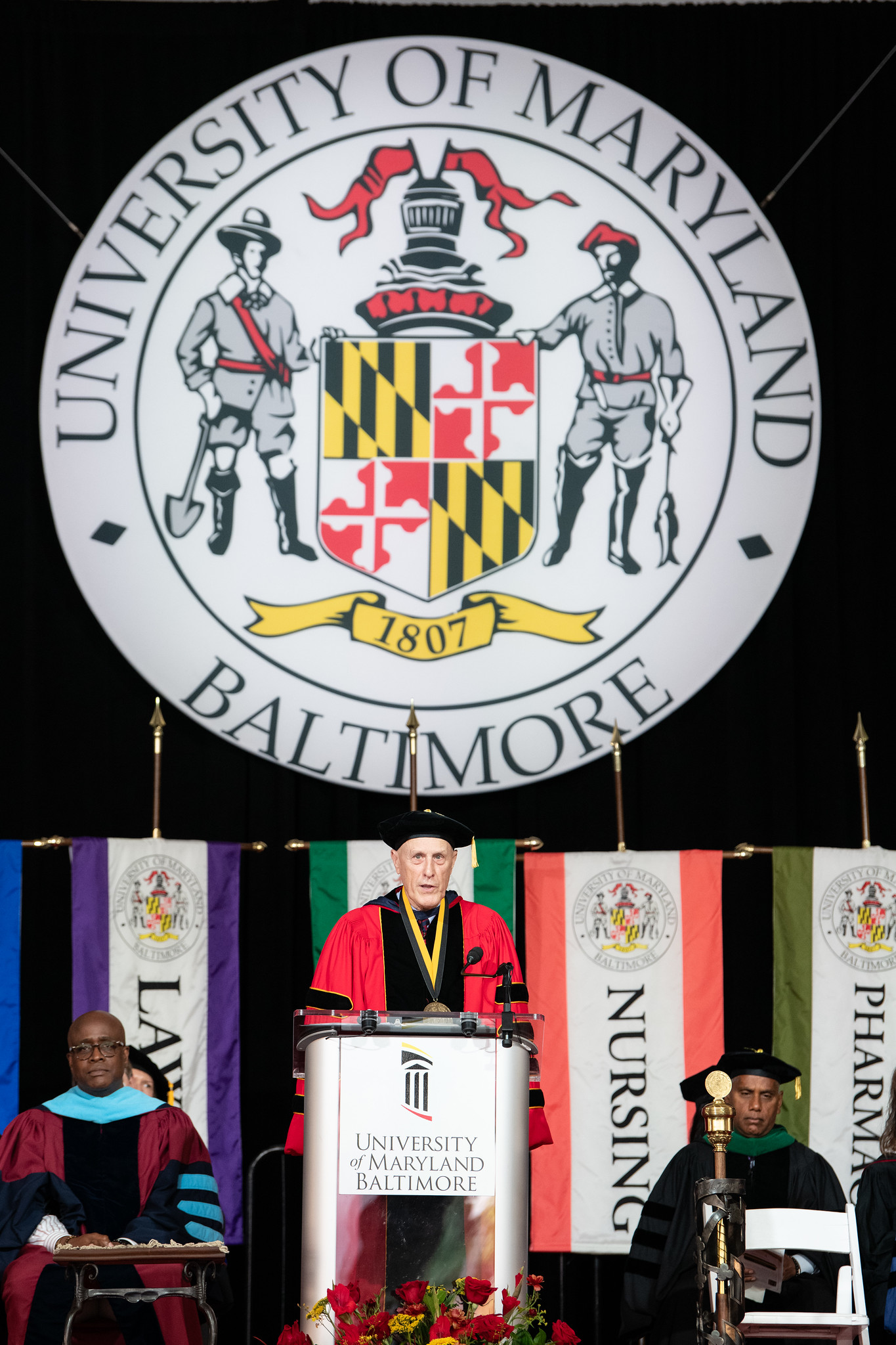UMB Is Rising to the Occasion, Jarrell says
September 17, 2025 Lou Cortina
At the Faculty Convocation, the president praises the University for its resilience in challenging times, recalling a procedure he and his surgical team performed years ago amid a power failure.
Photo: President Bruce Jarrell speaks during UMB’s fourth annual Faculty Convocation, which was held Sept. 11. (Photo by Matthew D’Agostino)
University of Maryland, Baltimore (UMB) President Bruce E. Jarrell, MD, FACS, closed the University’s Faculty Convocation on Sept. 11 with a story about a challenging procedure he undertook years ago as a surgeon, comparing it to the challenging times facing higher education in general and UMB in particular.
Taking to the podium after three faculty members had spoken on various topics during the fourth annual Convocation, Jarrell recounted the story of Maria, an 18-year-old woman from Mexico whom he treated when he was chair of the Department of Surgery at the University of Arizona.
(Read about the 2025 Faculty Convocation and watch a recap video below.)
Maria had been born with a rare liver disease that caused her to have intermittent and gastrointestinal bleeds, with each episode being life-threatening.
“She had seen a lot of doctors, and I was her last option,” Jarrell said. “I knew the surgery well, and I immediately wanted to help her, because that’s what we do as doctors. But I would have to do the surgery in Hermosillo, 200 miles south of the U.S. border.”
Jarrell said he and his surgical team made a five-hour trip to Hermosillo, where an operating room had been set up in a large general hospital.
“The procedure involves finding two very fragile veins deep in the abdomen, clamping them, and sewing them together. That was the solution to Maria’s problem,” Jarrell said. “After these very delicate veins have been sewn together, you take the clamps off, fix the expected bleeding from the suture line, and that’s it.
“We found the hard-to-find veins after several hours. We sewed them together. It went very well. And then we removed the clamps … and BOOM! The lights went out.”
Hermosillo had experienced a power failure, and it was pitch black in the operating room, making it nearly impossible to find or fix any bleeding at the suture lines.
“In those moments, I could hear only two things: the sound of Maria being ventilated by hand by the anesthesiologist, keeping her alive, and the ticking of the clock on the wall,” Jarrell said.
“It was the worst situation and the worst possible time. High stakes? You bet. I think everyone here today knows that type of situation — something critical occurs, something doesn’t go as planned. That’s what the last six months in this country have felt like to me.”
Jarrell ticked off the challenges: National Institutes of Health grants being canceled and new grants not being awarded; student support systems coming under fire in the areas of financial aid and international student visas; patient services and health insurance programs being cut; and, closer to home, budget cuts in the state of Maryland.
“Each one of these challenges limits our capacity to achieve our mission — to improve the human condition. But when you combine them at once, where does all this lead? It feels like the lights have gone out and I am back in that operating room in Hermosillo: in the dark at a critical time, not knowing where important things stand, and unable to find out until the light returns.”
Jarrell said at that moment in Mexico, he had to trust his team to keep Maria alive while he kept pressure on the veins to stop any bleeding without harming them. Eventually a flashlight was found, and he was able to complete the surgery successfully.
“Five years after the surgery, I met Maria again. She was thriving and had no further GI bleeding. She was a new person. She had hope for the future,” Jarrell said.
Jarrell said his optimism for UMB’s future lies in its people — faculty, staff, and students — and praised his leadership team of deans and vice presidents for its steadfast advice and for “rising to the occasion.”
He noted that the Issues Management Advisory Group, formed in January, includes more than 60 experts from across the UMB schools, keeping the University up to date on federal guidance and orders plus other issues big and small. And he praised all faculty and staff for staying committed to the University’s mission.
“I see all of you, focused on the task at hand, hard at work. It’s what you always do,” he said. “You’re controlling the controllable and not being distracted by the noise in the background.
“What I see here at UMB gives me hope for the future: Classes are full, and clinical services in medicine, dentistry, nursing, and pharmacy are impactful and robust. I see impact from the School of Law and School of Social Work in our community and with their clients. We are in sync with the University of Maryland Medical Center and Medical System, and research and scholarly productivity are alive, in spite of the many uncertainties at the federal level.”
Amid these challenges, Jarrell told the audience to remember that the United States “is still the greatest country in the world.”
“I really do believe this,” he said. “And, yes, there are confusing federal policies at times and conflicting messages or court decisions. But it is our country, and we cannot let the people of this country forget that it is universities like UMB that help make our country great.
“So the lights will come back on. You’ll see,” Jarrell added. “In the meantime, use your expertise, your intuition, and your dedication to serve all of UMB and the people of Maryland.”